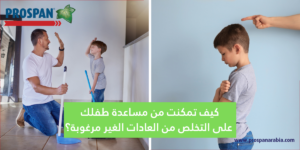
Most children go through a phase where they stick to an unwanted habit as a coping strategy for how they feel, either nervous, bored, insecure, or frustrated. Habits such as thumb sucking, nail-biting, nose-picking, etc.… will be outgrown by your child. Yet, parents need to take some action towards these body-focused repetitive behaviors. In this article, you will find tips to help children overcome these behaviors before they get out of hand.
Thumb and Pacifiers sucking.
Thumb sucking usually starts in the early months of a baby’s life. This behavior may worsen when babies start teething, especially the permanent ones (around the age of 5). This habit may cause teeth to shift and change in arrangement. Therefore, parents need to help their kids stop thumb sucking and stop providing a pacifier by the age of maximum four. Here are some tips to help get rid of the pacifier:
- Cut slits in the mouthpiece of the pacifier. This makes it less effective and often children will lose interest.
- Let your child help put all his/her pacifiers in a jar and leave it overnight for the “pacifier fairy” for a special treat from the “fairy”.
- If going “cold turkey” is too hard, have your child leave the pacifier in the bedroom every morning so that they can only use it at bedtime or naptime.
Nail and cuticle biting
It’s one of the most common “nervous habits”. It can result in recurrent bleeding or infection of the nail bed. Here is how you can tackle this issue:
- Cut their nails more regularly to avoid long nails.
- Find a substitute that a child can be snacking on such as veggies and fruits.
- Find something that will keep your child’s fingers active such as a stress ball.
- Create a reward system by establishing a sticker chart and mark off every day that your child doesn’t bite his nails to get rewarded.
- Try bite-averting nail polish.
- Gently remind your child to stop by touching his arm.
Nose picking
Nose picking is one of the least socially acceptable behaviors yet very common. It can start when crusting occurs from infection, allergies, or minor trauma. Picking causes more irritation to the nose, may create a vicious cycle and could cause frequent nosebleeds.
- Make your child wash their hands after catching them pick their nose.
- Always approach your child with a tissue and keep it around.
- Keep the nose moist with Nisita spray and Nisita ointment to alleviate dryness and avoid crusts.
- Make them adopt the habit of going to the bathroom to gently blow their nose.
- When in public, create a “code word” with your child that you can say to gently request that your child stop picking.
- Give your child something to keep their hands busy and out of their nose.
Teeth grinding
Clenching usually starts when the baby starts teething (6 months) and when the permanent teeth come in (5 years old).
Teeth grinding happens during sleep. Children usually outgrow it, but bruxism may continue into adulthood. It can be concerning as it may cause dental problems or a disorder of the jaw joint. Consult a dentist if this habit got out of hand.
Hair twirling/hair pulling
This behavior can be a release for intense or anxious children. However, if hair twirling/pulling persists, it may lead to hair loss.
- Find a replacement for the hair-twirling behavior. A soft blanket, new stuffed animal, fake piece of hair, or a baby doll with long hair may do the trick.
- Encourage your toddler to find other ways to release pent-up energy, with physical activities.
- Pay attention to what is going on at home that may be causing your toddler stress.
- If all else fails, get your child’s haircut short. A shorter haircut may be less tempting to twirl.
Always remember that someday these behaviors will vanish, parents may stress about it, yet make sure you do not reflect that on your child. Do not give a lot of attention to their habits, praise your child for good behavior, always state the rules, and talk gently with your child about it.
